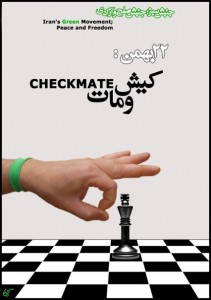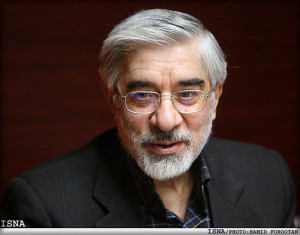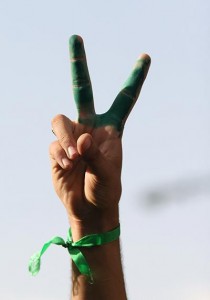
2045 GMT: But There are Limits. One leading international media organisation is proclaiming that it has mobilised itself to cover Thursday's events in Iran. It has even set up
a dedicated Twitter account for Iran, announced throughout today in a series of tweets.
Only problem is that this broadcaster/website hasn't quite got the hang of using Twitter for gathering latest news rather than for self-promotion. Total number of Twitter accounts it is following? 7, all of whom happen to be its own staff.
NEW Iran Document: Khatami Statement for 22 Bahman (8 February)
NEW Iran Special: The 57 Journalists in Iran’s Prisons
NEW Iran Advice Video: Palin to Obama “Bomb and You Get Re-Elected”
Iran Special: The Weakness of the Regime “It’s Deja Vu All Over Again”
Iran: The “Reconciliation” Proposals of Karroubi’s Etemade Melli Party
Iran: “Conservative Opposition” Offer to Mousavi “Back Khamenei, We Sack Ahmadinejad”
Iran Space Shocker: Turtle-Astronauts Defect to West
The Latest from Iran (7 February): Tremors
2020 GMT: 22 Bahman is Back! The "Western" media, which only 12 hours ago seemed to be oblivious to anything Iran-related unless it had the word "nuclear", has re-discovered the internal events and tensions.
Numerous services are carrying the report of the Associated Press on the Supreme Leader's speech (1245, 1420, & 1940 GMT), while
The New York Times picks up on Reuters' summary of the statements of Mir Hossein Mousavi (1635 GMT) and Mohammad Khatami (separate entry). Even America's
ABC News has taken notice, catching up with Saturday's interview of Mehdi Karroubi in a German magazine.
And CNN, declaring that it was going to cover Iran closely before and on Thursday, has launched
a special section on its website.
2015 GMT: Shutting Down the News. Pedestrian follows up on the arrest of photographer Amir Sadeghi, the creator of the excellent
Tehran Live, and the detentions of both sisters of blogger
Agh Bahman.
1940 GMT: We Are Number One (and We Will Punch You). More on the Supreme Leader's tough talk today (see 1245 GMT), one in which he did not walk out because of an inconvenient question (see 1420 GMT):
Today, there exists no system like the Islamic establishment in the world that can stand unshakably in the face of heavy, hostile propaganda, political and economic pressures and sanctions....[Because of our] reliance on God...whenever the people fear for the Revolution and sense threats and animosity, huge crowds of people, spontaneously and without convocation, take to the streets across the country.
1935 GMT: Blocking the Airwaves. An Iranian activist has reported that Voice of America Persian
can no longer be received in Tehran.
1655 GMT: This Just In. Heading off to an academic commitment, but had to note this statement by the US Government and European Union, released by the White House:
The United States and the European Union condemn the continuing human rights violations in Iran since the June 12 election. The large scale detentions and mass trials, the threatened execution of protestors, the intimidation of family members of those detained and the continuing denial to its citizens of the right to peaceful expression are contrary to human rights norms.
Our concerns are based on our commitment to universal respect for human rights. We are particularly concerned by the potential for further violence and repression during the coming days, especially around the anniversary of the Islamic Republic's founding on 11 February.
We call on the Government of Iran to live up to its international human rights obligations, to end its abuses against its own people, to hold accountable those who have committed the abuses and to release those who are exercising their rights.
1635 GMT: Summary of Mousavi's Statement. Mir Hossein Mousavi
told a group of youth and student activists today:
Disgracing and insulting people and the freedom of thought has nothing to do with Islam. I believe that the nation knows what is best for it and the collective wisdom is the superior wisdom and that is why the Islamic Revolution happened. If we want to save Islam as an asset for the nation, our own interests should not endanger the interests of Islam....
The only demand of the force that has come to the scene today is to return to the main laws and values of the Islamic Revolution, but it is being falsely accused. The Green Movement of the nation of Iran is independent, rational and peaceful. We are not opposed to Basij, the Revolutionary Guards or the police; but rather we are opposed to violence, beating and killing.
1630 GMT: Claim of the Day. The Los Angeles Times, citing a source inside Tehran's police headquarters,
claims up to three million opposition protesters may be on the streets on Thursday. The source compared that number to 500,000 pro-Government demonstrators who were out in Tehran on 30 December. The article also claims that about 12,000 Basiji militiamen will be moved into the capital from around the country.
1445 GMT: We've just come out of a discussion of EA's coverage for 22 Bahman to see the English translation of today's statement by former President Mohammad Khatami. We've posted
in a separate entry.
1420 GMT: Challenging the Supreme Leader.
Khodnevis reports that, during Ayatollah Khamenei’s recent meeting with academics, Hojatoleslam Javadi-Amoli (the son of Ayatolah Javadi-Amoli),
asked a pointed question about the President. Javadi-Amoli referred to an encounter between his father and Ahmadinejad, in which the President claimed that, during a speech to the United Nations General, he was covered by a halo of light. The video of the President's account was posted on YouTube but, during the 2009 campaign, Ahmadinejad claimed the story was lies made up by the enemy.
Javadi-Amoli asked the Supreme Leader, “We see many times in religious texts that the ruler of Islamic countries, in order to protect the interests of his country’s people, is permitted to hide parts of the truth, but he cannot say that his own saying is a lie and attribute it to the ramblings of a sick mind. Can one expect justice from such a ruler?”
At that point Khamenei says that he did not have time and left the meeting.
1300 GMT: The reformist Islamic Iran Participation Front
has issued its call for Iranians to accompany Green and opposition figures in the 22 Bahman rally.
Green movement activists in Ahvaz
have also put out a statement.
1255 GMT: Another Media Detention. Amir Sadeghi, photographer for Farhange Ashti,
has been arrested at work.
1250 GMT: We Will, We Will Rock You. The Tehran commander of the Islamic Revolution Guards Corps, General Hossein Hamadani,
has declared again that the Revolutionary Guard will "deal severely" with any protesters on Thursday.
1245 GMT: We Will, We Will Punch You. That is the Supreme Leader's latest line for Thursday, as
he told Air Force personnel, "The Iranian nation, with its unity and God's grace, will punch the arrogance (of Western powers) on the 22nd of Bahman in a way that will leave them stunned."
Using the foreign agents gambit to rule out legitimate protest, Khamenei said that the "most important aim of the sedition after the election was to create a rift within the Iranian nation, but it was unable to do so and our nation's unity remained a thorn in its eyes".
1135 GMT: The Next 22 Bahman Move? A group of youth and student activists
have met with Mir Hossein Mousavi today,
declaring that they will march on Thursday with Green symbols to seek justice and freedom and announcing "to the totalitarians" that sooner or later they will free the Islamic Republic from oppression. We are awaiting a text of Mousavi's remarks.
1125 GMT: Another High-Profile Sentence. Former Deputy Foreign Minister Mohsen Aminzadeh has reportedly been
given a six-year prison term for "disturbing" national security and spreading propaganda.
1110 GMT: Targeting Mortazavi. 57 members of Parliament have written to the head of Iran's judiciary, Sadegh Larijani, and President Ahmadinejad to
demand the immediate dismissal and trial of Presidential aide Saeed Mortazavi for his alleged role in the Kahrizak Prison abuses.
1100 GMT: Khomeini v. The Regime. Ezzatollah Zarghami, the head of Islamic Republic of Iran Republic,
has replied sharply to the complaint of Seyed Hassan Khomeini about IRIB's "censorship" of the speeches of his grandfather, Ayatollah Khomeini: "If only you had written a protest letter to condemn the shameful events after the election...."
0940 GMT: Million-Dollar Defendant. After 216 days in detention, Feizollah Arab Sorkhi, a senior member of the reformist Mojahedin of Islamic Revolution party, finally
stood trial on Sunday. Proceedings are ongoing; Arab Sorkhi’s bail has been set at more than $1 million.
Meanwhile, journalist Emadeddin Baghi
remains in solitary confinement despite the end of his interrogation.
0935 GMT: A New Voice. The Green Voice of Freedom website, from which we are pictured up some latest news items,
has launched an English edition.
0930 GMT: Freed. Amidst the dominant news of arrests, a belated notice of released: last week 10 students from Elm-o-Sanat University, detained on and after Ashura,
were let out of prison.
0920 GMT: And Now the Real News. Following the complaint from Seyed Hassan Khomeini, the Imam's grandson, to the head of Islamic Republic of Iran Broadcasting, Ahmad Montazeri --- son of the Grand Ayatollah, who died in December ---
has sent a letter of protest.
The issue is an IRIB interview with former Minister of Intelligence Ali Fallahian, who launched a fierce criticism of Grand Ayatollah Montazeri.
0910 GMT: It Gets Worse. The BBC's top radio programme,
Today, having done
a muddled but creditable effort to get beyond the misleading headlines on Iran (see 0715 GMT), threw it all away with
an appalling interview an hour ago.
The fault lay not with the interviewee, Mark Fitzpatrick of the International Institute for Strategic Studies, but with the interviewer, Evan Davies, whose obsession was to establish that Iran might soon have The Bomb. That distortion was only corrected at the end of the discussion, when Fitzpatrick --- moving from theory and fantasy to reality --- noted that Iran does not have the technical capacity to maintain its current civilian programme, let alone establish weapons capability.
Meanwhile, the Green Movement made a fleeting appearance as the device to get a "more acceptable regime" in Iran on the nuclear issue.
Across the Atlantic,
Juan Cole does an effective job taking away Secretary of State Hillary Clinton's "scare" rhetoric in her interview with CNN on Sunday and then putting the Ahmadinejad declaration in appropriate context.
0820 GMT: And This is Just Silly.
Reuters reports, without blinking an eye, Salehi's declaration, ""Iran will set up 10 uranium enrichment centers next year."
Hmm.... At least that's not quite as extravagant as President Ahmadinejad's snap announcement last autumn that Iran would build 20 centres (an event that EA readers recalled yesterday). Reuters might also want to note, beyond its sentence, "Analysts have expressed skepticism whether sanctions-bound Iran, which has problems obtaining materials and components abroad, would be able to equip and operate 10 new plants", that Iran cannot even keep one centre, Natanz, functioning at more than 50 percent capacity.
0745 GMT: Nuclear Kabuki. Tehran keeps up the sideshow this morning, with Iranian state media
headlining the declaration of the head of Iran's Atomic Energy Organization, Ali Akhbar Salehi, "We have written a letter to the International Atomic Energy Agency (IAEA) to announce our intention to enrich uranium to 20 percent. We will send this letter to the world's atomic watchdog on Monday and then start enrichment on Tuesday in the presence of inspectors and observers from the IAEA."
Dramatic? No. This is no more than a restatement of what Iran is allowed to do under the Non-Proliferation Treaty, since the 20-percent level is for civilian rather than military uses. Indeed, that is (and has been for months) the real uranium issue: whether soon Iran runs out of fuel for its medical research reactor.
0715 GMT: The gap between image and reality has widened overnight in coverage of Iran. The "Western" press, with few exceptions, have now done their lemming jump into a simplistic portrayal of President Ahmadinejad's Sunday media stunt: his declaration that Iran would immediately start producing 20-percent enriched uranium so it can ensure self-sufficiency if there is no "swap" deal with the West.
This morning, BBC's top radio programme has one of the better stories, noting both the obvious (that Ahmadinejad's expectation is "unrealistic", given the technical issues with Iran's nuclear programme( and the important (that the move, in large part, comes from domestic pressure). Even so, the piece opens with the overall declaration that this is "yet another step" in "Iran's nuclear confrontation" with Western powers, which is a bit curious since --- less than a week ago --- the Iranian President was reviving the possibility of a "swap" of enriched uranium outside Iran.
And, beyond that, the
bigger picture of the post-election challenge to the Iranian Government and possibly the Iranian system fades.
CNN, for example, is making a big noise on Twitter that it is launching in-depth coverage for the demonstrations of 22 Bahman, Thursday's anniversary of the 1979 Revolution. Yet
its feature story is solely devoted to Ahmadinejad's Sunday proclamation, with the internal situation distorted into two concluding paragraphs:
Sunday's announcement of the new enriched uranium plans falls within the 10-day period marking the 31st anniversary of the 1979 Islamic revolution that toppled the U.S.-backed shah.
Celebrations commemorating the overthrow began last week and will culminate on February 11.
The immediate damage is that the important developments inside Iran escape notice. This morning, for example, we have
published a list of 57 journalists who are detained, amongst hundreds of other political prisoners.
The wider significance of such blinkered and sensational visions is that it is unlikely that the complexities of the contest for power will not be understood on Thursday. Instead, 22 Bahman will suddenly leap into the media frame as a breathless and somewhat confused story of "What are the numbers?", "Where is the violence?", and "Where is the video?", with little appreciation of the real pressure on President Ahmadinejad.
That pressure is coming from inside the Iranian establishment, as well as outside it. Perhaps more importantly, Thursday could be a marker of whether that pressure builds on other parts of the regime, including the position of the Supreme Leader.
22 Bahman is three days away.
 Friday, February 26, 2010 at 10:48
Friday, February 26, 2010 at 10:48  From The Newest Deal:
From The Newest Deal:


